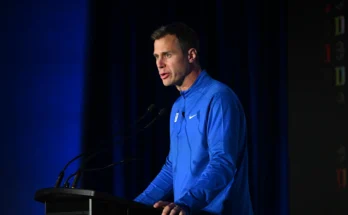When Lane Kiffin, head coach of the Ole Miss Rebels, speaks about the atmosphere at Tennessee Volunteers Stadium, it is clear that he isn’t just paying lip service to a well-known college football environment. Kiffin, who has had his fair share of high-stakes games and rowdy crowds throughout his career, recently described Tennessee’s home stadium, Neyland Stadium, as having an atmosphere unlike any other in the country. His words reflect not just the intensity of the crowd but the deep cultural and emotional connection the Tennessee Volunteers have with their fans. For Kiffin, who had a tumultuous tenure as Tennessee’s head coach in 2009, his remarks carry a layer of personal insight that only someone who’s been in the thick of the action can offer.
Kiffin’s perspective is a unique one, as he was not only a former assistant coach in the college ranks but also spent time as the head coach at Tennessee, albeit for just one season. His stint in Knoxville was filled with controversy, as Kiffin’s departure to USC after just one season was seen as a betrayal by many Volunteers fans. However, as he reflects on the atmosphere at Tennessee’s stadium, there’s no denying the depth of the passion and the unique energy that courses through the place when it’s filled with tens of thousands of Volunteers faithful. The capacity of Neyland Stadium—holding over 100,000 fans—creates a spectacle that is hard to match in any sport. When you step into the bowl of Neyland on game day, the sound is deafening, and the energy in the stadium can be palpable.
It’s not just the size of the stadium or the noise level that make the atmosphere so special; it’s the connection between the players, coaches, and the fans. In Tennessee, football is a way of life. The Volunteers are not just another college football team; they are an integral part of the community. The program has a long history, filled with moments of glory and periods of struggle, but through it all, the fanbase has remained fiercely loyal. From the moment the team runs out onto the field to the final whistle, the energy from the crowd never wavers. Every play, every hit, every touchdown is met with a collective roar that reverberates throughout the entire stadium.
For Kiffin, who has coached in multiple high-profile programs, including the NFL, the atmosphere at Tennessee stands out as a one-of-a-kind experience. As a coach who’s seen firsthand the impact that a rowdy home crowd can have on the game, Kiffin understands the psychology of playing in such an environment. The noise can create a sense of chaos, and that can often be to the advantage of the home team, who thrive in the chaotic atmosphere. The fans’ energy is infectious, and it can be the driving force that propels the Volunteers to victory or stifles their opponents.
But what makes this atmosphere so special? Kiffin attributes much of it to the deep-rooted traditions of the Tennessee Volunteers program. From the moment the team steps onto the field to the sounds of “Rocky Top” echoing through the stadium, there is a sense of history and pride that comes with wearing the orange and white. Fans don’t just attend the games; they live and breathe Tennessee football. It’s a cultural phenomenon that transcends sport. When you’re at Neyland Stadium, you’re not just watching a game; you’re participating in something much larger than yourself. The players on the field are not just athletes; they are symbols of the university, the community, and the state of Tennessee.
The atmosphere at Tennessee Volunteers Stadium is also a testament to the passion and loyalty of the fans. Volunteers fans are known for their unwavering support of the team, whether they’re winning or losing. It’s a devotion that extends far beyond game day, with fans following the team through every twist and turn of the season. The crowd at Neyland is known for being loud and passionate, and they don’t just cheer for their team; they cheer for the spirit of Tennessee football. For Kiffin, who’s had the opportunity to coach in various environments, the intensity of the Tennessee fanbase is unmatched.
As the head coach of Ole Miss, Kiffin’s team has had the opportunity to play in Neyland Stadium, and he’s seen the way the environment can affect both the players and the game itself. When the stadium is filled to capacity, it becomes a living, breathing entity. The crowd’s energy creates an atmosphere that can be overwhelming for opposing teams. As much as the fans are a source of pride for the Volunteers, they can also be a force to be reckoned with. Kiffin’s words serve as a reminder of how crucial the home crowd can be in college football, where the noise and energy can often tip the scales in favor of the home team.
One of the key factors that contribute to the electricity of Neyland Stadium is the tradition of the Vols’ “Power T” run-out. The team’s entrance is a highly anticipated moment, where the players burst through a giant T-shaped banner onto the field, greeted by an explosion of cheers from the crowd. This moment is symbolic of the Volunteers’ pride and unity. The fans become an extension of the team, and for a few moments, everyone in the stadium is united in a common purpose: to support their team. It’s an experience that transcends sport and becomes something much deeper, a shared ritual that ties everyone together.
Kiffin’s comments also reflect the broader significance of college football in the Southeastern United States. In states like Tennessee, Alabama, and Mississippi, football is more than just a pastime; it’s a way of life. The competition on the field is a source of identity and pride for communities, and for the players and coaches, it represents the culmination of years of hard work. When a coach like Kiffin speaks about the atmosphere in Neyland Stadium, he’s acknowledging the power that sports can have in shaping the culture of an entire region. For many in Tennessee, the success of the Volunteers isn’t just about wins and losses; it’s about community, pride, and tradition.
Kiffin’s observations also remind us of how rare and unique these environments are in the world of sports. While other programs may have passionate fanbases or large stadiums, the combination of tradition, history, and fervent support at Tennessee’s home games creates an atmosphere that is truly distinctive. It’s an environment that fosters not only competition but camaraderie, where every fan feels like they’re an essential part of the team’s journey.
As Kiffin continues his career at Ole Miss, it’s clear that he has a profound respect for the atmosphere at Tennessee, even if his tenure there was brief and marked by controversy. His remarks serve as a testament to the undeniable force of Neyland Stadium, where football is more than just a game—it’s a way of life, and the passion of the fans can fuel the Volunteers to greatness. As college football continues to evolve, the legacy of stadiums like Neyland, with their unparalleled energy and devotion, will continue to define the sport for generations to come.
In conclusion, Lane Kiffin’s reflection on the atmosphere at Tennessee Volunteers Stadium is a recognition of what makes the sport of college football so special. The combination of tradition, fan passion, and an unbreakable connection to the team creates an atmosphere that is truly unparalleled. For Kiffin, and for countless others who have experienced it, Neyland Stadium remains a symbol of the power of college football to unite people, create unforgettable moments, and generate a level of energy that is unmatched in any other sport.



